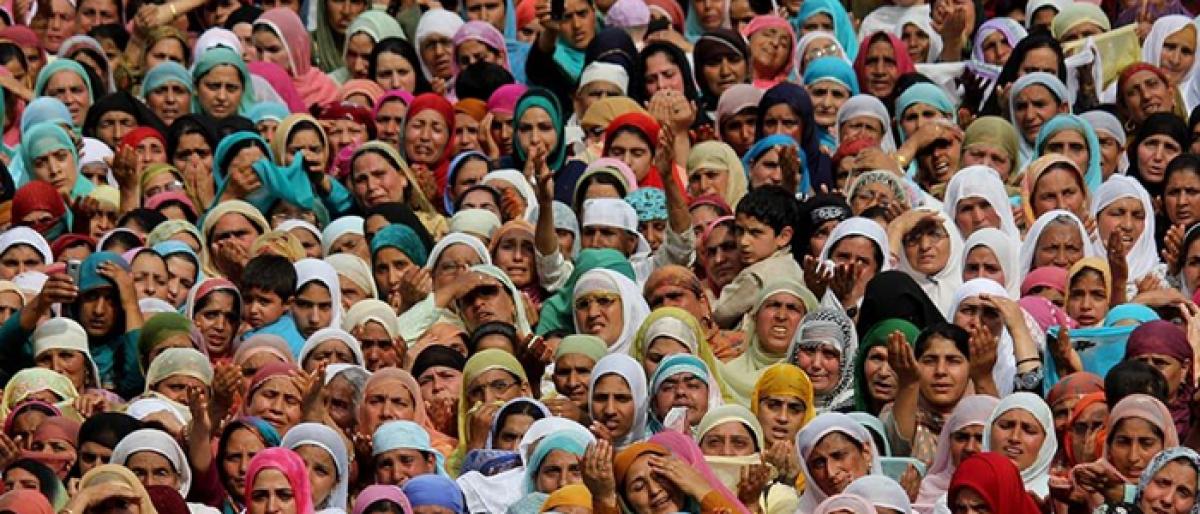Live
- India Faces Blow as Pacer Mohammed Shami Ruled Out for Remainder of Australia Series
- Biden Pardon: Joe Biden Commutes Death Sentences of 37 Inmates, Including Child Killers and Mass Murderers
- South Korea: Yoon believes impeachment trial takes priority over martial law probe
- Strict Action for Non-Adherence to Time Management - DMHO Dr. Swarajya Lakshmi
- Over 13.29 lakh houses approved for rural poor in Maharashtra: Shivraj Chouhan
- District Collector Urges Timely Completion of Indiramma Housing Scheme Survey
- Digital Arrest Scam: Hyderabad Man Duped of ₹7 Lakhs by Fake Crime Branch Police Callers
- Sukhbir Badal seeks President's Police medal for officer who saved his life
- US Firm Accordion Acquires Merilytics, Launches 1,500-Seater Office in Hyderabad
- Free Medical Camp Organized by Alampur Advocate Bar Association
Just In

It goes back before the independence of India in 1927 that Dogra ruler of the princely state of Jammu Kashmir, Maharaja Hari Singh imposed a law that defined state subjects and their rights In that notification, the ruler of the state said that residents would be preferred over outsiders for employment in the Government
It goes back before the independence of India in 1927 that Dogra ruler of the princely state of Jammu & Kashmir, Maharaja Hari Singh imposed a law that defined state subjects and their rights. In that notification, the ruler of the state said that residents would be preferred over outsiders for employment in the Government. After J&K's accession to India, popular leader Sheikh Abdullah took over reins from the Dogra ruler. In 1949, he negotiated J&K's political relationship with New Delhi, which led to the inclusion of Article 370 in the Constitution of India. Article 370 guarantees special status to J&K, restricting Union's legislative powers over three areas: defence, foreign affairs and communications.
Article 35A of the Constitution of India, unknown to the public till recent times, has raked up an intense debate in the country. The Constitution of India is based on the principle of equality and guarantees equality before law. However, unlike other States the position of women in the State of Jammu and Kashmir remained inferior. There is one very important issue which differentiates the women of Jammu and Kashmir from the rest of the women in the country and make them feel discriminated and that is Article 35A of the Constitution of India. It disqualifies them from their State subject rights if they married non-permanent residents. This raises a very important question as to whether it is constitutionally permissible to discriminate on the basis of sex of a person only so far as bestowing upon the State subject is concerned.
There are two conceivable categories of Permanent Residents of the State of J&K based upon their sex:- (I) Male Permanent Residents of the State of J&K married to Female Non-Residents of the State of J&K and Female Permanent Residents of the State of J&K married to Male Permanent Residents of the State of J&K; (II) Female permanent Residents married to male non-Permanent Residents of the State of J&K.
There is no confusion so far as first category is concerned, but the problem comes up while bestowing the right and status of Permanent Resident on the offspring of category-II. Whereas sons and daughters of category-I are given the status of Permanent Residents because of birth, the same is denied to category–II. This denial of status of permanent resident of the State of J&K to the offspring of category-II viz.; female permanent residents married to non-permanent residents, is violative of Article 14 of the Indian Constitution. The situation in certain cases is more grave , where female Permanent Resident of the State of J&K who has married to a Non-Permanent Resident of the State of J&K has to come back to permanently reside in the State of J&K for the reason of :- Divorce; Widowhood; Permanent settlement for any other reason.
The Constitution of India does not recognise discrimination on the basis of sex and as in this case, the only reason for discrimination is based upon sex of the parent of the beneficiary, the same may not hold good in the eyes of law and is legally not sustainable. Thus, the fundamental rights of such persons guaranteed under the Constitution of India as also under the Constitution of the State of Jammu and Kashmir get sufficiently defeated. Denial of right of citizenship of the State of J&K by way of grant of Permanent Resident Certificate to the offspring of the female permanent resident of the State of J&K married to a non-permanent resident is per-se illegal, arbitrary, discriminatory and violative of Article 14 of the Constitution of India and ultra-vires.
The theme and architecture of relevant provision of the Constitution of Jammu and Kashmir as also the laws/Rules/Regulations framed thereunder pertaining to grant of Permanent Resident Certificates are being interpreted by the State in a manner just to defeat the fundamental rights guaranteed under the Constitution of India. It is a settled position of law which is also the basic theme of Article 14 of the Constitution of India that discrimination on the basis of sex of a person is violative of Right to Equality.
(Neeru Mishra - The author is an advocate from Jammu and Kashmir)

© 2024 Hyderabad Media House Limited/The Hans India. All rights reserved. Powered by hocalwire.com







